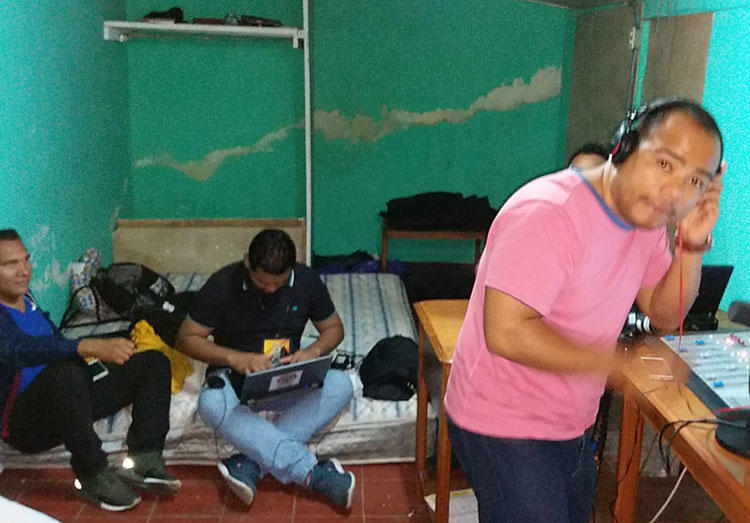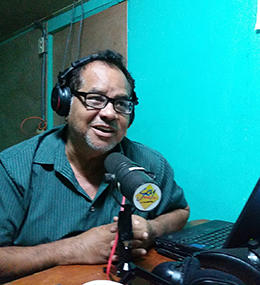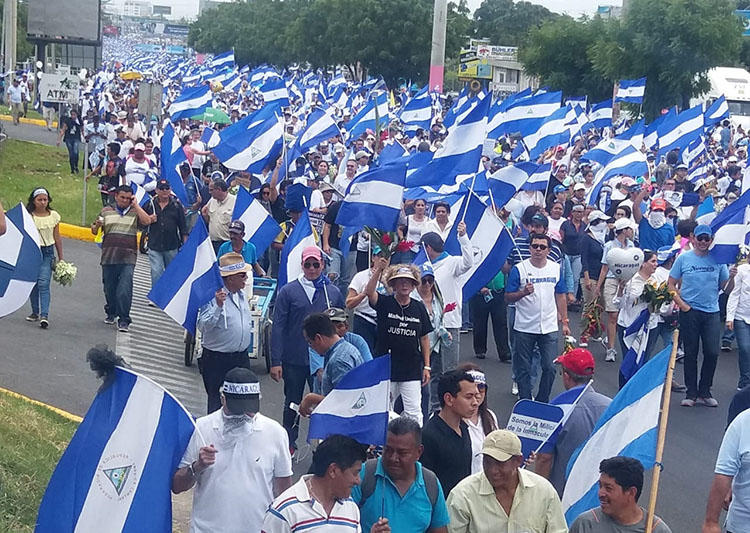At the temporary office of Radio Darío in the Nicaraguan city of León, reporters have set up two emergency escape routes: a trap door that opens into the dining room of the house next door and a ladder leading to the roof.
Radio Darío workers are, understandably, spooked. About a dozen of them were caught inside the station’s original headquarters on April 20 when it was set on fire by a pro-government mob. They escaped, but the building was destroyed, a security guard was hospitalized with burns, and two of the arsonists died in the flames, according to news reports.
“They tried to burn us alive,” Henry Blanco, a Radio Darío reporter, told CPJ during a visit last month to the nondescript bungalow in León that now houses the station. “But we are adapting.”
The attack was part of a wave of violence against Nicaragua’s independent media as they cover a three-month-old uprising against President Daniel Ortega. One was shot dead while reporting via Facebook live. Many other journalists told CPJ that they have been beaten, shot at by snipers or had their equipment stolen by police or pro-Ortega paramilitaries.
The government’s violent crackdown on the protests, which rights groups say has killed more than 300 people, caught most Nicaraguans, including journalists, off guard. Now, reporters and editors are scrambling to protect themselves.

“Everything happened so fast that we didn’t have any protocols on how to cover the uprising,” Octavio Enríquez, an editor at the independent Managua newspaper, La Prensa, said.
Corrugated metal sheets now cover the doors and windows of the La Prensa building to protect it from pro-government mobs or looters. Administrative employees leave work at 4 p.m. ahead of a de facto curfew due to rising crime in the capital. Rather than risk going home after dark, reporters on the late shift sometimes sleep on mattresses in the newsroom.
Out on the streets, reporters often face the wrath of police and masked gunmen who they say have targeted reporters critical of the Ortega government.
“We have to be so careful because we are being attacked,” said Ivette Munguía, a La Prensa reporter who says she was wrestled to the ground and kicked by police agents who stole her phone during a demonstration in April.
At the privately owned 24-hour cable news station 100% Noticias, news director Lucia Pineda said that police agents robbed two of the station’s cameras. To minimize the risks, her reporters now cover the protests in teams or travel into danger zones alongside humanitarian groups. In other cases, the station uses cell-phone videos of protests and police attacks sent in by citizens.
“Sometimes we don’t send our reporters out and instead rely on the collaboration of the people,” Pineda said.
Wilfredo Miranda, a reporter for of the independent online news website Confidencial, told CPJ that after he was threatened at a protest he noticed masked gunmen hanging out in his neighborhood. Fearing that they would target him, Miranda said he moved out and rented an apartment closer to the newsroom.
Foreign correspondents are also being harassed. Tim Rogers, the senior Latin America editor for the online news site Fusion, said that in April pro-government social media sites published photos of him claiming that he was a CIA agent. The U.S. Embassy contacted Rogers to warn that he could be in danger. Rogers said he cut short his reporting trip by three days and returned to the U.S.
“I probably won’t go back to Nicaragua until there is regime change,” he said.
The Inter-American Commission on Human Rights last month denounced government attacks on journalists, declaring in a communiqué: “The state needs to investigate those events and protect media and reporters who face a real and imminent risk of renewed attacks.”
CPJ’s calls to the police and to the office of Vice-President Rosario Murillo, who is Ortega’s wife and handles press inquiries, were not returned. In a July 4 interview with The Guardian, Paul Oquist, who serves as Ortega’s minister of national policies, blamed “fake news” for some of the unrest.
“There are peaceful demonstrators to be sure, but there is a pro-coup movement trying to destabilize the country using organized looting parties, fake news and quite depraved killings,” he said.
Journalists said that police have not targeted the pro-government news outlets that dominate Nicaragua’s media landscape. But they have sometimes been harassed by protesters. On May 28, an armed mob in Managua set fire to the entrance of Tu Nueva Radio Ya, a pro-government radio station, causing minor damage.
The fire at Radio Darío was more extensive. The attackers poured gasoline on the building and set it alight, causing nearly half a million dollars in damages, station owner Aníbal Toruño said.

In response the Inter-American Commission on Human Rights urged the Ortega government to adopt precautionary measures to protect the lives of 64 Nicaraguans, including the Radio Darío staff.
“It’s mostly symbolic, but it might help,” Toruño said.
Founded in León in 1949, Radio Darío takes its name from Rubén Darío, Nicaragua’s most famous poet who worked as a journalist in the late 19th century. The independent station has irritated numerous governments and its installations have been attacked or vandalized seven times, said Leo Cárcamo, who directs of one of the station’s main news programs.
Since the fire, Cárcamo said that jittery property owners have been reluctant to rent space to Radio Darío. It has relocated twice and now operates from the cramped bedroom of a house of a supporter. The office furnishings include a desk, a couple of chairs and a mattress on the floor where journalists drink coffee and write news stories.
Should they come under renewed attack, Radio Darío journalists have rehearsed climbing to the roof and squeezing through the trap door into the neighboring house.
“I could not sleep peacefully if I did not help them,” said the woman who owns the house and asked to remain anonymous. “Now, if they come to burn the station again they have an escape route.”
Amid the unrest Radio Darío has scrapped music and sports and switched to a 24-hour news format. But the local economy has come to a standstill and Radio Darío has lost about 90 percent of its advertising. Toruño vows to keep broadcasting.
“We are a symbol of democracy, which is why the government is trying to destroy us,” he said.
[Reporting from León and Managua.]
